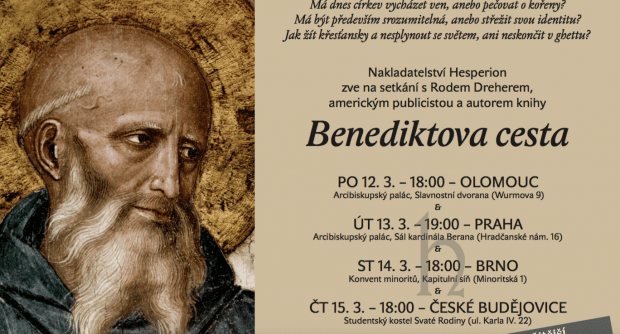An Island Of Truth In Liquid Modernity

An encouraging letter from a French Catholic Millennial who read the French version of The Benedict Option:
Hello Rod,
I’m [deleted], 23, and I wanted to say thank you ! I read your book Comment être Chrétien dans un monde qui ne l’est plus, le Pari Bénedictin, in October, and I really liked it. I took 8 pages of notes to be able to share it with my friends !
I met you at Paray-le-Monial when you visited for the conference with Henrik Lindell. It was really nice to hear you in person, and I invited one of my friends to whom I’d read parts of your book to come, we really connected with what you were saying.
It was fascinating to read what you are going through in the United States, and there was also a lot I could relate to. From time to time I also read your blog on the American Conservative. It seems to me that we have different issues between France and the US :
In the US, you are still in a phase where laïcité/secularism is rising, and things are getting worse, but you still have more freedom, and lots of people feel christian by tradition and are attached to religious freedom.
BUT : I feel like the left, the sexual revolution, the LGBTQ, the artificial procreation advocates, (reading your articles regarding the trans trend for teens, for example) are much stronger and much more powerful in the US than in France, where they are also rising, but only as an export from the US (in my opinion).
I very strongly connected at the beginning of the book with what you described as DET (MTD in english), Ethico-therapeutic deism. It is somewhat close to what I was experiencing myself (though I felt something was lacking) until I met practicing and orthodox catholics in my engineering school in Toulouse ! For some reasons, my family couldn’t transmit me the whole catholic faith, and even though I attended a private catholic school, I never received a proper catholic education (I was very disappointed with what I was taught). I had the chance to meet a great community in Toulouse in my engineering school however, and thanks to them I received solid teaching, examples, and a community where I fitted in ! If only I’d been able to meet this kind of people earlier… I feel like people embrace DET/MTD like I used to because we are not offered other options.
As I see it, for us young catholics in France, those who stay practicing christians are those who embrace the church’s teaching and go against the world, against the current. We can’t be timid or lukewarm in our faith, we can’t compromise, or it’s impossible to stay Christian, since there are so many opposing forces ! We feel the need to be taught, to learn and to practice our faith, and it’s very liberating. As you said when you met us, we have nothing to lose! And if we don’t learn, we won’t be able to transmit anything to our children.
The examples you gave of successful communities also gave me a lot of hope.
The cultural divide with people from our generation has never been so strong, but paradoxically, sometimes we can have interesting conversations since people no longer know about Christianity and they accept that they can learn from us what it really is, and sometimes discover that the image painted in the media is not particularly accurate (Only in one on one conversations though). It also helps that in a completely liquid society where nothing is stable, we have a set point of view and we believe in the existence of Truth! Of course, on a national level, all the media are very anti-catholic, anti-christian, and very ignorant about what the catholic faith really is.
This reminded me of an interesting article I saw today from the Catholic Herald, in which Millennials talk about how the Internet and social media led them to convert to Catholicism. I found this especially apt:
Todd Hartch, a history professor at the University of Eastern Kentucky, was received into the Church in 2010. “The internet was crucial to my conversion,” he says over email. “I live in an area with a weak Catholic presence, no Catholic seminaries or universities, and little in the way of catechesis or intellectual life, so the internet was my best connection to the wider Catholic world.
“I really don’t think I’d be a Catholic today if I’d been dependent on physical books, which would have been more difficult to find, and the resources of my local parish.”
I converted to Catholicism in the early 1990s, before the Internet. I became Catholic in spite of the instruction at the local parish, which was utterly wishy-washy. Because of First Things magazine (mostly), the encyclicals of John Paul II, and my independent reading, I was aware that what the Catholic faith actually taught was rather different from what I saw in that parish and heard from the priest and the nun who were instructing catechumens. I remember being so frustrated with the warmed over 1970s milquetoast that we were being taught that I left instruction and found a hard-edged elderly Irish priest at a downtown parish. He heard my story, and said to me, “By the time I get through with you, lad, you might not be a Catholic, but you’ll know what a Catholic is.”
That was golden. I thought of dear old Father Moloney when I read this graf in the Herald article. Emphasis below is mine:
This Easter, the Church will receive a new convert: Elena Attfield, a postgraduate student at LSE. As an Evangelical, Attfield used Facebook and Instagram to share the Gospel, “and Catholics were a prime target”. But when some Catholics reached out to her, her perspective began to change.
The doctrines about Our Lady were a puzzle. So Attfield posted her questions in a couple of Facebook groups. “Each got about 200 comments,” she recalls. “They were all different – people recommending books, offering different ideas, or prayers. It was really helpful to know that you’re not alone.”
Attfield appreciated that Catholicism came across as “non-ecumenical” and “intolerant” of error. “If it hadn’t been like that, I probably wouldn’t have converted.” The doctrine of Extra ecclesiam nulla salus (no salvation outside the Catholic Church) intrigued her – “I thought, if the Church is teaching such a big thing, I need to be sure it isn’t true” – and it helped her to convert. But it was also important that Catholics showed “patience and the willingness to engage gently”.
Ha! Warmed-over 1970s mush is not going to attract committed Catholics any more in 2018 than it did in 1992. As the French student writes:
It also helps that in a completely liquid society where nothing is stable, we have a set point of view and we believe in the existence of Truth!
There is a good lesson in that for Protestant and Orthodox too. To modify a line of Chesterton’s, a dead thing can go with the mainstream of liquid modernity, but only a living thing can go against it.
Hey, readers in Budapest, I’ll be speaking about the Benedict Option at the Danube Institute on Friday March 9. All are welcome, but you have to register here to attend. I’ll also be headed to Prague and elsewhere in the Czech Republic the following week to talk about the Benedict Option, which has just been published in Czech. I’d love to meet you. Click here to find out where and when I’m speaking, and to register.
One thing I find about these speeches I give in Europe is that young Christians who show up are usually pleased to meet others who feel as they do. They hadn’t realized it before. In France last week, I had a beer with an American recent graduate of Hillsdale who had just arrived in France last fall when I was there to promote the French edition. She came to my talk because her dad, a reader of this blog, urged her to. I introduced her to my French friends, and she’s become a pal of theirs. She told me last week that meeting other Christians so early really made a difference in her experience in France. If you’re a believing Christian in Hungary or the Czech Republic, why not come to one of my talks and see who you can meet?

UPDATE: Columnist Carmody Grey, from 2015:
These older Catholics experienced the dark world of pre-conciliar Catholic liturgy, spirituality and theology. For them, Vatican II held the promise that their faith would be meaningful and spiritually nourishing to their children. They speak confidently about the changes that continue to be necessary: more democratic structures of governance; ordained ministry for women; the acceptance of homosexual unions and of artificial birth control. The list goes on. The alternative, they say, is the slow death of a Church increasingly irrelevant, speaking only to itself.
Like all dreams of an inexorable onward march of enlightenment, this attitude expresses the ever-recurrent myth that history only goes forwards, in a straight and predictable trajectory from where we are now. But neither the Church nor the world always goes forwards. The confident expectation that ever-increasing “secularisation” would force the Church to change has proved to be the naive dream of a particular moment in modern European social thought. I cannot speak for the culturally and religiously diverse public square, but inside the Church, the future is not where this older generation seems to think it is.
Young Catholics who are actually practising their faith seek a countercultural identity: a sense of self and a community which sets them apart from their peers, which makes them feel, as every new generation wants to feel, that they are special. Just as the Sixties generation did in its turn, they are “rebelling”, but what they are rebelling against is the moral and spiritual drabness and homogeneity of contemporary youth culture. The Catholics whose faith journeys I have shared, whom I live and work with, want a religious identity that is proudly at cross-purposes with what surrounds them; that is unashamedly traditional, in contrast to the prevailing obsession with the novel and the transient. They want markers of this counterculture to be apparent at the deepest level of their behaviour and identity. Catholic sexual and gender ethics is one of the ways many of them stand in strongest relief against their social background. Older Catholics would be surprised by how many of them admire the “theology of the body”, resist gay marriage, embrace gender roles and look forward to practising natural family planning. They celebrate discipline and expect high standards of religious observance. They know and rejoice in their differences from Protestants, and, in particular, from Anglicans. Their heroes are John Paul II and Benedict XVI.
These young Catholics do not want a faith that is just a hobby, an adjunct to a life otherwise indistinguishable from that of their peers. What excites and motivates them about the Catholic faith is its difference: its demanding, unfashionable, life-altering difference.
Does the older generation realise how brief may be the spell of its particular brand of liberal Catholicism? I watch its slow disappearance with a combination of pride and anxious misgiving. The cherished values of the Vatican II generation are a hard-won treasure that young Catholics tend not to appreciate. But my generation has seen that what the human soul longs for is a high and heroic task: a mountain to climb, a wall to breach, a battle to win. God’s prophets are always at an angle to the world.
Yes, yes, YES! The Christian faith as a “high and heroic task,” not an electric blanket and a wubby.
